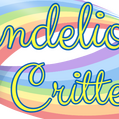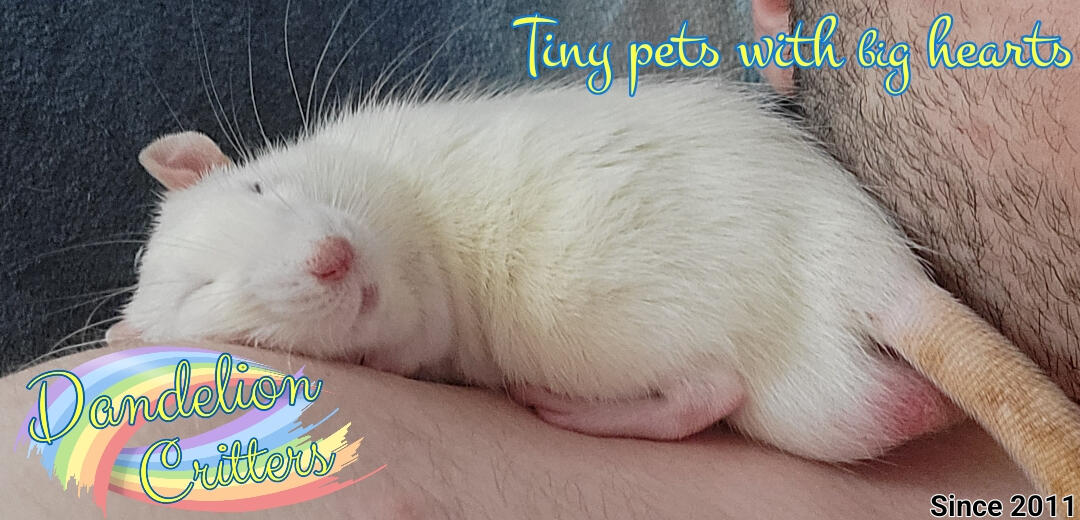Last Update : 9 April 2024 • 21:55 pm ESTThis website is still under construction, some links may be blank.
This website's content was fully written by myself.
Please refrain from copy-pasting things, just share the link of the pages!
Welcome to our new website!
Dandelion Critters is not only a Mouse & Rat breeder, but also a person obsessed with providing easy access to ressources that may get lost easily online!
This site will be your "hub" for everything mice & rats!
This is also my rodentry's website, because both goes hand in hand.
You can access Adoption information and other things related to our animals by selecting the button below!
Latest Updates :
9 April 2024 • 9:55 pm • Added Genetics 101, Genetic Lingo & X-Brindled Gene pages.
8 April 2024 • 1:30 am • Links & Directory updates.
28 March 2024 • 1:00 am • Various updates.
Directory
Our Rodentry
- ㅤ▶ About Us
- ㅤ▶ Terms of Adoption
- ㅤ▶ Adoption Fees
- ㅤ▶ Our Animals
- ㅤㅤㅤ▶ Rats
- ㅤㅤㅤ▶ Mice
- ㅤㅤㅤ▶ Others
- ㅤ▶ Available Animals
- ㅤㅤㅤ▶ Rats
- ㅤㅤㅤ▶ Mice
- ㅤ▶ Supplies & Extras
- ㅤ▶ Custom Memorials
- ㅤ▶ Rodentry F.A.Q.
- ㅤ▶ The Book of Memories
- ㅤ▶ Useful Local Places
- ㅤㅤㅤ▶ Mrs Toad's Depot (Pet Store)
- ㅤㅤㅤ▶ Pet Stores & Supplies
- ㅤㅤㅤ▶ Veterinarians & ER
- ㅤ▶ Fun Awards
Rat Ressources
- ㅤ▶ Genetics 101
- ㅤㅤㅤ▶ Genetic Lingo
- ㅤㅤㅤ▶ Coats
- ㅤㅤㅤ▶ Colors
- ㅤㅤㅤ▶ Markings & Patterns
- ㅤㅤㅤ▶ Morphology
- ㅤㅤㅤ▶ Selection
- ㅤ▶ Medications
- ㅤㅤㅤ▶ Parasite Treatments
- ㅤㅤㅤㅤㅤ▶ Ivermectin
- ㅤㅤㅤㅤㅤ▶ Selamectin
- ㅤㅤㅤ▶ Antibiotics
- ㅤㅤㅤㅤㅤ▶ Amoxicillin
- ㅤㅤㅤㅤㅤ▶ Doxycycline
- ㅤㅤㅤㅤㅤ▶ Enrofloxacin
- ㅤㅤㅤ▶ Miscellaneous
- ㅤ▶ Cage & Environment
- ㅤㅤㅤ▶ Common Myths
- ㅤㅤㅤ▶ Cleaning Schedules
- ㅤㅤㅤ▶ Bedding
- ㅤ▶ Health & Behavior
- ㅤㅤㅤ▶ Hormonal Agression
- ㅤㅤㅤ▶ Illnesses & Injuries
- ㅤㅤㅤ▶ Body Language & Communication
- ㅤㅤㅤ▶ Sexing
- ㅤㅤㅤ▶ Breeding
- ㅤ▶ Nutrition
- ㅤ▶ Bioactive Set-Up
- ㅤ▶ Useful Links
- ㅤ▶ Associations & Clubs
Mouse Ressources
- ㅤ▶ Genetics 101
- ㅤㅤㅤ▶ Genetic Lingo
- ㅤㅤㅤ▶ Coats
- ㅤㅤㅤ▶ Colors
- ㅤㅤㅤ▶ Markings & Patterns
- ㅤㅤㅤㅤㅤ▶ X-Brindled / European Brindle
- ㅤㅤㅤ▶ Morphology
- ㅤㅤㅤ▶ Selection
- ㅤ▶ Medications
- ㅤㅤㅤ▶ Parasite Treatments
- ㅤㅤㅤㅤㅤ▶ Ivermectin
- ㅤㅤㅤㅤㅤ▶ Selamectin
- ㅤㅤㅤ▶ Antibiotics
- ㅤㅤㅤㅤㅤ▶ Amoxicillin
- ㅤㅤㅤㅤㅤ▶ Doxycycline
- ㅤㅤㅤㅤㅤ▶ Enrofloxacin
- ㅤㅤㅤ▶ Miscellaneous
- ㅤ▶ Cage & Environment
- ㅤㅤㅤ▶ Common Myths
- ㅤㅤㅤ▶ Cleaning Schedules
- ㅤㅤㅤ▶ Bedding
- ㅤ▶ Health & Behavior
- ㅤㅤㅤ▶ Hormonal Agression
- ㅤㅤㅤ▶ Illnesses & Injuries
- ㅤㅤㅤ▶ Body Language & Communication
- ㅤㅤㅤ▶ Sexing
- ㅤㅤㅤ▶ Breeding
- ㅤ▶ Nutrition
- ㅤ▶ Bioactive Set-Up
- ㅤ▶ Useful Links
- ㅤ▶ Associations & Clubs
Miscellaneous
Our Rodentry
Why chose our pets?
Dandelion Critters is a Rodentry located in Perry, GA.We are animal lovers with years of experience with rodents of all kind, yet our favorite will always remain Rats & Mice!
We work a lot on our rodents health and their behavior, as well as their appearance and quality. It is not as simple as "putting a male and a female together".We pride ourselves with the exceptional temperament of our animals ; we spend countless hours socializing them, taming them, and making sure that they will already be very loving once they reach your home.Our rodents are also treated for parasites prior to leaving our Rodentry through veterinarian approved anti-parasitic treatment ( Selamectin ) as a preventive measure

Terms of Adoption
UNDER CONSTRUCTION
UNDER CONSTRUCTION
Adoption Fees
We work a lot on our rodents health and their temperament, as well as their appearance and quality. Some varieties are harder to breed due to different reasons, or require in general more work. It is not as simple as "putting a male and a female together".We pride ourselves with the exceptional behavior of our animals ; we spend countless hours socializing them, taming them, and making sure that they will already be very loving once they reach your home.Our animals are also treated for parasites prior to leaving our Rodentry through veterinarian approved anti-parasitic treatment (Selamectin) as a preventive measure.
Rats are adopted in same-sex pairs of TWO RATS MINIMUM.Female Mice are adopted in same-sex groups of TWO MICE MINIMUM.Male Mice are SOLITARY and WILL fight to death if housed together ; they are adopted SOLO.
We make NO profits ;All money made go right back into the animals in terms of ;Food, enrichment, housing, veterinary care, donations to rescues / charities / owners in need of help, and more.Providing you with pet quality animals is our passion, and we put everything we can towards that goal.
Color, Ear type & Sex do not affect the prices.
| Species | Variety | Price Each |
|---|---|---|
| Rat | Standard | $30.⁰⁰ |
| Rat | Dwarf carrier | $40.⁰⁰ |
| Rat | Dwarf | $60.⁰⁰ |
| Mouse | Regular | $10.⁰⁰ |
| Mouse | X-Brindled | $35.⁰⁰ |
Our Animals
Not all of our animals are listed, mostly to avoid overloading the website, but I try to put at least most of the rats on here!
These animals are NOT available.
UNDER CONSTRUCTION
Book of Memories
Just an album for some of our departed critters.

Click on the pictures to see them bigger.More to be added soon...
Available Animals
Chose which category of animals you wish to view!
Available Rats
All the rats are listed individually.
Don't forget to review our Terms of Adoption & Fees before contacting us.
UNDER CONSTRUCTION
DCS • -
SEX : ...
DOB : ...
VARIETY : ...PROSPECT : ...
AVAILABLE FOR PICK UP AFTER : ...ADOPTION FEE : ...
STATUS : ...

Available Mice
All the male mice are listed individually.
All the female mice are listed per variety as they often lookalike.
Don't forget to review our Terms of Adoption & Fees before contacting us.
UNDER CONSTRUCTION
| Bin # | Variety | Status | Order # |
|---|---|---|---|
| A | B | C | F |
Supplies & More
UNDER CONSTRUCTION
| Quantity | Item | Price |
|---|---|---|
| ... | ¼ qt FMR Rodent diet | $5.⁰⁰ / ×1 |
| ... | ¼ qt PDZ ammonia control granules | $10.⁰⁰ / ×1 |
| ... | Single Reusable House - Mouse | $3.⁰⁰ / ×1 |
Custom Memorials
UNDER CONSTRUCTION
UNDER CONSTRUCTION
Rodentry F.A.Q
UNDER CONSTRUCTION
UNDER CONSTRUCTION
Useful Local Links
Everything around Perry GA that can be useful!
UNDER CONSTRUCTION
Local owned exotic pet store, nominated best in GA 2023.
Get all your supplies and more from there!
I also happen to work there!
Local Veterinarians.
Rat Ressources
UNDER CONSTRUCTION
- ㅤ▶ Genetics 101
- ㅤㅤㅤ▶ Genetic Lingo
- ㅤㅤㅤ▶ Coats
- ㅤㅤㅤ▶ Colors
- ㅤㅤㅤ▶ Markings & Patterns
- ㅤㅤㅤ▶ Morphology
- ㅤㅤㅤ▶ Selection
- ㅤ▶ Medications
- ㅤㅤㅤ▶ Parasite Treatments
- ㅤㅤㅤㅤㅤ▶ Ivermectin
- ㅤㅤㅤㅤㅤ▶ Selamectin
- ㅤㅤㅤ▶ Antibiotics
- ㅤㅤㅤㅤㅤ▶ Amoxicillin
- ㅤㅤㅤㅤㅤ▶ Doxycycline
- ㅤㅤㅤㅤㅤ▶ Enrofloxacin
- ㅤㅤㅤ▶ Miscellaneous
- ㅤ▶ Cage & Environment
- ㅤㅤㅤ▶ Common Myths
- ㅤㅤㅤ▶ Cleaning Schedules
- ㅤㅤㅤ▶ Bedding
- ㅤ▶ Health & Behavior
- ㅤㅤㅤ▶ Hormonal Agression
- ㅤㅤㅤ▶ Illnesses & Injuries
- ㅤㅤㅤ▶ Body Language & Communication
- ㅤㅤㅤ▶ Sexing
- ㅤㅤㅤ▶ Breeding
- ㅤ▶ Nutrition
- ㅤ▶ Bioactive Set-Up
- ㅤ▶ Useful Links
- ㅤ▶ Associations & Clubs
Mouse Ressources
UNDER CONSTRUCTION
- ㅤ▶ Genetics 101
- ㅤㅤㅤ▶ Genetic Lingo
- ㅤㅤㅤ▶ Coats
- ㅤㅤㅤ▶ Colors
- ㅤㅤㅤ▶ Markings & Patterns
- ㅤㅤㅤㅤㅤ▶ X-Brindled / European Brindle
- ㅤㅤㅤ▶ Morphology
- ㅤㅤㅤ▶ Selection
- ㅤ▶ Medications
- ㅤㅤㅤ▶ Parasite Treatments
- ㅤㅤㅤㅤㅤ▶ Ivermectin
- ㅤㅤㅤㅤㅤ▶ Selamectin
- ㅤㅤㅤ▶ Antibiotics
- ㅤㅤㅤㅤㅤ▶ Amoxicillin
- ㅤㅤㅤㅤㅤ▶ Doxycycline
- ㅤㅤㅤㅤㅤ▶ Enrofloxacin
- ㅤㅤㅤ▶ Miscellaneous
- ㅤ▶ Cage & Environment
- ㅤㅤㅤ▶ Common Myths
- ㅤㅤㅤ▶ Cleaning Schedules
- ㅤㅤㅤ▶ Bedding
- ㅤ▶ Health & Behavior
- ㅤㅤㅤ▶ Hormonal Agression
- ㅤㅤㅤ▶ Illnesses & Injuries
- ㅤㅤㅤ▶ Body Language & Communication
- ㅤㅤㅤ▶ Sexing
- ㅤㅤㅤ▶ Breeding
- ㅤ▶ Nutrition
- ㅤ▶ Bioactive Set-Up
- ㅤ▶ Useful Links
- ㅤ▶ Associations & Clubs
Ressources F.A.Q
UNDER CONSTRUCTION
UNDER CONSTRUCTION
Hacks & Crafts
UNDER CONSTRUCTION
UNDER CONSTRUCTION
Blank Forms & Files
UNDER CONSTRUCTION
UNDER CONSTRUCTION
Identification Methods
UNDER CONSTRUCTION
UNDER CONSTRUCTION
Genetics 101
A repertory of everything about the genetics of pet mice!I FOCUS ON DATA OF VARIETIES LESS COVERED ON OTHER FANCY MICE WEBSITES.Everything in here is filed by scientific data, breeders data/experience, etc.Sources are always at the bottom of each section, unless the button redirect you to the person's website.To get your articles or sites added, please contact me :)
I HIGHLY suggest to take a look at the "Genetic Lingo" page before anything else.I tried to make it short and simple, with multiple comparisons and visuals for people who need more than simple "this word means -insert more genetic lingo-" 😂.
Genetic Lingo
UNDER CONSTRUCTION
Locus
The position of a gene or mutation on the chromosome.Each Locus has a group of Alleles attached to it.Each Locus has 1 "Wild Type Allele", it is either Lowercase or Uppercase and simply mean to be used as a filler "This 1 Allele spot is a blank spot".Exception of the Locus A
The Locus A is the "base colors" Locus.
A mouse ALWAYS has the A Locus.A "Wild Type" mouse is Agouti and carry nothing :
A/A B/B C/C D/D E/E etc.
A/A = Agouti
All the other uppercases are not "dominant genes", it just means "there's nothing here, it has not mutated".
Gene
A piece of DNA inherited from the parents and dictate which proteins produce (including those alffecting colors, patterns, pigments, etc.)
Allele
Alleles are a type of gene ; the animal inherit, for each locus, one from the father, one from the mother.Every animal has two Alleles per Locus, nothing more, nothing less.
Dominant
Dominant Alleles are displayed by an uppercase letter.An animal need only one Allele for the gene to be visually noticeable.It cannot be "carried", therefore if none of the parents display the gene, it cannot appear in their offsprings.If the second Allele is also a Dominant one, the highest one on the inheritance ladder will be visible and overwrite the other.If the second Allele is "semidominant" or "other", both will be visible.If the second Allele is "recessive", it will not affect the visual, but it means the animal "carry" that gene.
Semi-Dominant
Semidominant Alleles are generally displayed by an uppercase letter, but some may have a lowercase.An animal requires only one Allele for the gene to be visually noticeable.If the second Allele is the same semidominant, something else happens (the visual effect is different than only one).It cannot be "carried", therefore if none of the parents display the gene, it cannot appear in their offsprings.If the second Allele is "Dominant" or "other", both will be visible.If the second Allele is "recessive", it will not affect the visual, but it means the animal "carry" that gene.
Recessive
Recessive Alleles are displayed by an lowercase letter.An animal requires both Alleles for the gene to be visually noticeable.Two different recessive Alleles can interract.
In most Locus, the visual expression will be based on the Allele highest on the hereditary ladder of the Locus.It CAN be "carried", therefore, it may appear in offsprings even if it is not visible on the parents!If the second Allele is "Dominant", only the Dominant one will be visible.If the second Allele is "semidominant" or "other", both will be visible.If the second Allele is "recessive", the highest hereditary one will affect the visual, and the lowest is "carried".EXCEPTIONS
The Locus C has many Alleles ( all recessives ) that all interract with each other to form different visual results.
Genotype
The list of genes relevant to the animal, per Locus.Example :
This mouse is A/A b/b D/dThe first set is the Locus A.
This specific mouse has two Agouti Alleles : it does not carry any recessives from the Locus A.The second set is the Locus B.
This specific mous has two recessive chocolate Alleles : it means that the chocolate gene is activated!The third set is the Locus D.
This specific mouse has one recessive blue Alleles : it does not activate the blue gene, BUT the mouse carry blue!This mouse is Cinnamon and carry blue!
Agouti + Chocolate
Phenotype
The "Variety" or "Name" given to what is visible.Example :
This mouse is CinnamonInstead of listing every genes in codes as explained above!
Sex-Linked Brindled
WARNING
This variety and page contain mention of mandatory euthanasia.
The six Alleles of the Mo Locus. There is way more, but they are the most relevant.
All of those are Sex-Linked and Semidominant.In the mouse hobby, at least in North America, we only have "Mo br".
¹ Viable Brindled happenned spontaneously in a lab Brindled colony. In this mutation, the males are more viable, but sterile, and tend to die more easily than females. Females Mo vbr pattern is more dramatically pale and white looking than Mo br.
It is unknown if this spontaneous mutation is present in Hobby Mo br colonies.
Click to View : The detailed description of Brindled
Heterozygous females are very similar to Atp7aMo/+ females in appearance but have normal viability. They have curly vibrissae, but the coat is not noticeably waved. Hemizygous males are almost devoid of pigment except in the eyes and ears. The vibrissae are strongly curled, and the coat is wavy. The abnormalities of hair structure have been described by Gr\"uneberg (J:5137). Males usually die when 2 weeks old, but a few have lived and been fertile. They have a behavioral abnormality consisting of a slight tremor, uncoordinated gait, and clasping of the hindfeet when held up by the tail (J:249, J:164). Females homozygous for Atp7aMo-br, and also heterozygous Atp7aMo-br/Atp7aMo and Atp7aMo-br/Atp7aMo-to females are identical in phenotype to hemizygous Atp7aMo-br males and die at the same age (J:164, J:12963). Histological examination of the brain of brindled males shows widespread neuronal degeneration in the cerebral cortex and thalamic nuclei and scattered degeneration in the cerebellum (J:6113). Heterozygous females have been shown to have neurochemical abnormalities as well (J:2026). In contrast to mice bearing other Atp7a alleles, brindled mice have no aortic lesions (J:12963) and no defect in crosslinking of collagen and elastin. Brindled males do, however, have a 30 to 40% reduction in lysyl oxidase activity in skin (J:5777). They have reduced synthesis of noradrenalin by dopamine--hydroxylase in the brain and peripheral nervous system (J:5323), and decreased activity of cytochrome C oxidase and superoxide dismutase (J:5830). These enzymes are all copper-dependent or copper-containing, and their reduced activity may be due to defective copper transport in cells of all affected tissues (J:5956, J:617, J:5747, J:12937). Brindled males have defective placental transport and defective intestinal absorption of copper. Copper concentration is high in gut mucosa, kidney, and testis and low in liver, brain, plasma, and most other organs (J:6204, J:6206). Concentration of the copper-binding protein metallothionein in various tissues is correlated with the concentration of copper (J:7370); however, hepatic metallothionein is inducible at normal levels in mutant neonates (J:24041). Parenteral injection of copper at 7 to 10 days of age has a striking therapeutic effect; it prevents tremor and early death, allows normal pigmentation, improves growth, produces normal concentrations of copper in organs previously deficient (except liver), produces normal activity of some copper-dependent enzymes (J:6205, J:7521), and prevents neuronal degeneration (J:6544). In heterozygotes with tabby (Eda), Atp7aMo-br resembles Atp7aMo-blo, and thus appears to act on coat color through an effect in hair follicles (J:5238). Copy-Pasted from : Original, Sources & References
The actual Locus this gene is located onto is called "Mottled", the Allele is "Mobr", or "Mottled : Brindled".Instead of a "color" or "addition to existing color", it is actually an "overlay" pattern : it dilutes stripes onto whatever color the mouse is, regardless of its markings, colors, patterns.It is not a color, and dilutes rather than adding, a little bit like bleaching a dark shirt or like coloring a mouse in dark blue with a pencil, then lightly erasing stripes!Fun fact : this means you can actually create a Brindle X-Brindled mouse!
(Avy + Mobr)Unlike US Brindle, which is a colored pattern of yellow with black stripes, Mottled is not attached to a color at all.
| REGION | NAME | LAB | ALLELE |
|---|---|---|---|
| U.S.A | X-Brindle, EU/UK Brindle, X-Brindled | Brindled, Mottled, Sex-Linked Mottled | Mo br |
| Canada | XBR, X-Brindle, X-Brindled | Brindled, Mottled, Sex-Linked Mottled | Mo br |
| Europe | Brindle | Brindled, Mottled, Sex-Linked Mottled | Mo br |
| Australia | EU/UK Brindle | Brindled, Mottled, Sex-Linked Mottled | Mo br |
The confusion...
Since it was named Brindle in its native region, it inherited it when exported as well, which caused an issue as we already had a different gene called Brindle in North America.
The "X" was added in front to highlight the difference and how it is female sex-linked.However, confusion still happens as most people only assume that it is just another version not too different than US Brindle, which couldn't be further from the truth!I personally call them X-Brindled to prevent such confusion.The ONLY 2 things US Brindle (A vy) and X-Brindled (Mo br) have in common is that they both have/creates a striped pattern, and are semidominant.
Sex Linked? X?
Note : My use of "female", "male" and chromosomes is solely in reference to DNA-bound sex, and is in no way relatable to human genders.
As its name implies, X-Brindled is Sex-Linked to the X chromosome ("female").While males can be birthed, they will thrive in the first two weeks but will thin and sadly die in the 3rd week due to lack of iron absorbtion.You cannot "prevent" it, or "give them a chance" , or "heal it" ; it is caused by a genetic disease located in the Mobr itself.Males X-Brindled die of malnutrition and starvation. It is horrendeously painful and slow.Please humanely euthanise the males as early as you can sex them to prevent avoidable pain.The chances of a male surviving and thriving into adulthood are so slim that it is not worth torturing hundreds / thousands of small babies just "in case" one eventually manage to make it.It is suspepcted that the only manner it can happen is if your Mo br spontaneously mutate in Mo vbr.DO NOT BREED X-BRINDLED MICE IF YOU ARE NOT ABLE TO HUMANELY EUTHANISE THE YOUNG MALE PINKIES.It is, sadly, MANDATORY for this variety.
If you decide to still do and "let nature take its course" :
You are cruel and unfit for ethical breeding of X-Brindled mice.You have TONS of mouse varieties you can breed that do not involve unviable offsprings, so do not chose the ONE that involves it only to let a defenseless baby slowly starve to death as its body slowly start shutting down.There is males X-Brindled in almost every litter.
You WILL have to euthanize.
Or get a vet to do so if your country's regulations requires it.
Healthy!
Unlike the A locus brindles and yellows, X-Brindled does not have any attachments to genetic obesity!Females are healthy, minus a possible weakened aorta, whilst the males suffer from Menkes genetic disease, which is the cause of their early death.
A rainbow of stripes!
As you may have figured by now, it means... You can have them in ANY color you want!Blue? Chocolate? Siamese? Black? Red? Agouti? US Brindle? Chinchilla?Yes, yes, AND MORE YES!
How to ID X-Brindled
Lucky for you, I've got plenty of pictures to help you with this task! I will also include a written version for those unable to see the pictures or people simply needing captions.
Since X-Brindled are Heterozygous only, there is 50% chances of X-Brindled babies, and 50% Regular babies.
Remember that sexes are also 50/50.
So the chances are :- 25% Female X-Brindled
- 25% Male X-Brindled
- 25% Female
- 25% Male
ID Male X-Brindled
- Whiskers : VERY short and so curly they are almost missing. They straighten a bit more each day but stay notably curly. Even on Smooth standard coat.
- Coat : Even on Smooth standard coat, they will look greasy/satin and a bit wavy. The satin shine remain but waves fades.
- Color : No matter what, they will always look like burmese, blue point siamese or pew. Basically pointed and/or pew. Even if no C-Dilutes in the line.
ID Female X-Brindled
- Whiskers : Medium length and brushed backwards towards the cheeks, very wavy. They straighten a bit more each day but stay wavy / all over the place.
- Coat : Even on Smooth standard coat, they will look a bit wavy. The waviness fades quickly.
- Color : Stripes matching the mouse color, but diluted as if you put a semi transparent white layer on the color!
( Black + dove stripes, Agouti + Argente stripes, Red + Cream stripes, etc. )
Male

Photography © x
Day 1
Female

Photography © x
Male

Photography © x
Day 2
Female

Photography © x
Male

Photography © x
Day 3
Female

Photography © x
Male

Photography © x
Day 4
Female

Photography © x
Male

Photography © x
Day 5
Female

Photography © x
Male

Photography © x
Day 6
Female

Photography © x
Male

Photography © x
Day 7
Female

Photography © x
Male

Photography © x
Day 8
Female

Photography © x
Male

Photography © x
Day 9
Female

Photography © x
Male

Photography © x
Day 10
Female

Photography © x
Please humanely euthanise males on day 1 if you can.
The only reason I allowed this one to go this long is for the purpose of this ID chart.I refuse to let him reach the stage where he will start to falter so Day 10 will be the final example.
Day 11
Female

Photography © x
Day 12
Female

Photography © x
Day 13
Female

Photography © x
Day 14
Female

Photography © x
More Images...
Please do not use any of these photos.
If you really want to share them, give the link to this page directly!
These were specially taken for this project!
Click on the arrows to see all the pictures.
All mice above were bred by Dandelion Critters.
All Pictures above were taken by Laurel Creek Rattery and/or Dandelion Critters.
Articles / Sources





Community Hub
A list of various community/discussion groups, servers, forums and more.
We are not affiliated with any of them.
I do not police the content of these groups, however I will actively remove them if I happen to see harmful/untrue content on them.
UNDER CONSTRUCTION